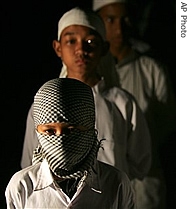2007年VOA标准英语-Southeast Asia Terrorist Group Splits, But Reta(在线收听)
By Nancy-Amelia Collins
Jakarta
28 February 2007
The Southeast Asia group Jemaah Islamiyah (JI), which has been blamed for a series of bombings over the past several years, has splintered into factions and may be heading in new directions. VOA's Nancy-Amelia Collins traveled to the heart of JI territory in Central Java, in Indonesia, and has this report.
In this part of Indonesia's central Java island, most people quietly eke out meager livings from the land and sea.
But this region has become notorious, after three brothers brought shame to their village. They helped carry out the bombings on the resort island of Bali in October 2002 that killed 202 people, many of them foreign tourists.
Here in the sleepy village of Tenggulun, those three brothers lived and thrived. Now Amrozi Nurhasyim and Ali Gufron are sentenced to death. Their brother Ali Imron is serving a life sentence.
All three had significant roles in the hard-line Islamist group Jemaah Islamiyah. And while the Central Java district is known as a spiritual home of the terrorist group, not everyone here supports it.
Thirty-two-year-old Malik was born and raised in Tenggulun and says the three brothers do not represent the village. He says he does not know why Amrozi and his brothers carried out the terrorists bombing on Bali, but he says many people in the village hate what they did.
The three brothers are representative of a radical faction of JI that is headed by Southeast Asia's most wanted terrorist, Malaysian Noordin Top. Under Noordin's leadership, the faction's goal has been to attack Western targets, and as result, hundreds of people have died.
 |
| Students of at Al Mukmin Islamic school line up as they prepare to welcome militant Muslim cleric Abu Bakar Bashir (File) |
The 69-year-old Bashir is accused of being the spiritual leader of Jemaah Islamiyah. It is a charge he denies. But he does not deny his belief in radical Islam.
In this Jakarta mosque, and many more like it across Java, Bashir preaches against non-Muslims, or infidels. He calls for the implementation of Sharia, or Islamic law, across the sprawling archipelago of Indonesia, a secular nation with the world's largest Muslim population. He says infidels will stay in hell forever and live in insecurity because they are the worst creatures living on earth. He says the person who is not ruled by Islam is poor in dignity.
The vast majority of Indonesians practice a moderate, tolerant form of Islam, but Bashir seeks an Islamic state across much of Southeast Asia that leaves little room for non-Muslims. He says according to Islam, infidels must not live freely, but must be monitored under Islamic law because they will cause destruction and kill people. Bashir says while the infidels cannot be forced to become Muslims, they must be forced to bow to Islamic law.
Nasir Abas was once a Jemaah Islamiyah leader, and he is the brother-in-law of Amrozi, one of the Bali bombers now on death row. He was arrested in 2003 and now works with the Indonesian police as an informant.
Like many of the group's leaders, he fought against the Soviet Union in Afghanistan. He later ran one of the largest JI training camps in the southern Philippines. And, like many others, he split with the organization after the 2002 Bali bombing.
"What they did is killing the civilians, killing unarmed people, killing a non-military people," he said. "So this is something that I can say - that is not war. That is not battle. That is not jihad. But that is a mass kill. A mass killing operation."
Indonesian authorities have arrested and prosecuted more than 300 Islamic militants over the past few years. While that has hampered JI's activities, the organization remains alive.
Sidney Jones, the Southeast Asia director of the research organization the International Crisis group, worries about a new, third Jemaah Islamiyah faction. Its members are fighting in the district of Poso, on Indonesia's Sulawesi island, where the population is divided between Christians and Muslims.
Until recently, Poso had been fairly calm after about 1,000 people died in sectarian fighting there between 2000 and 2001.
But recent violence in Poso following police raids to arrest Muslims militants has claimed the lives of 17 people.
"I think the danger of what happened in Poso is that they'll be able to attract people from outside the Poso area who don't believe in Noordin's targets at all but who also don't want to sit around quietly and do nothing, and who may see the opportunity for a jihad against what they see as anti-Islamic forces as being exactly what they were waiting for," said Jones.
Jemaah Islamiyah is a splintered organization, but it also is fluid and relentless. Experts say it continues to threaten Indonesia's secular, democratic society and security in the region.